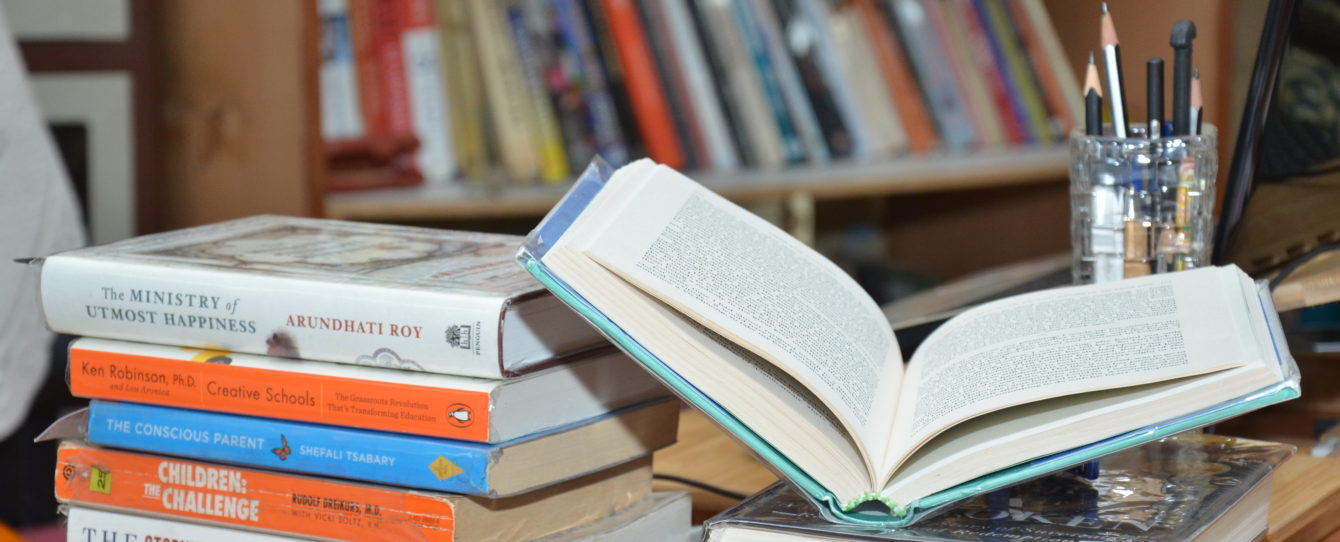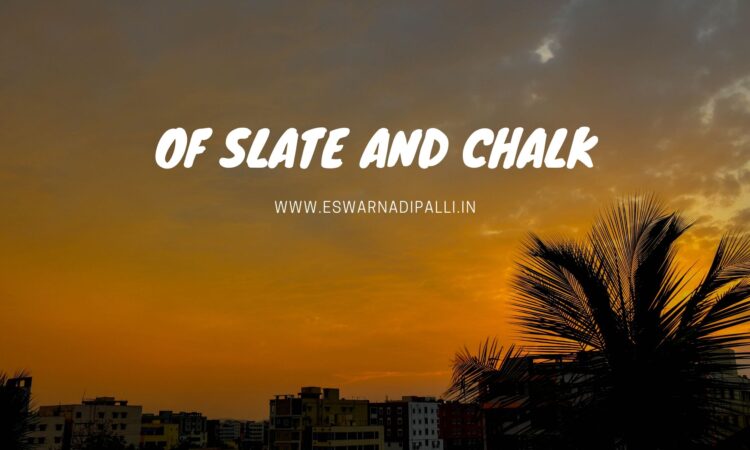Follow my blog with Bloglovin
(My grandfather, every day, walked me to the ‘school’ two houses away from my ancestral home across the dusty red road.
I’m trying to coax out of my memory bits and traces of how I was tamed to walk down and sit among a groups of brats – the scenario I remembered of my maiden scribble on a slate.
I’m happy for those nostalgic waves casting back and forth that took to life in this brief sketch of my childhood recollection.)
I don’t remember the village I was born, never been there even once, and I blame my mother she never showed a grain of interest, reason but then vague, to introduce me around the suburbs she grew in. I wanted to piece together the rural community she had spent before marriage, the personal interests, and social contacts in her formative years. Though I have hoarded six decades of recollections of the better part of my life, none could detail the precincts where my mother felt thrilled when my first cry filled the room.
It isn’t clear if my mother had avoided the trip willfully, but now passed away a decade ago, her family bloodline long detached for lack of good rapport. Time moved rather fast that I find myself not young enough to pursue the passion of probing the hamlet I was born.
Thankfully, if I could bring back the thrum of vivid childhood memories, they animatedly dance around my ancestral home – my dad’s father had built to accommodate his four sons and two daughters. My dad was the youngest and also the smartest. I admired my three uncles and aunts endowed with a reverential brilliance in portraiture painting, excited as a child, I roamed around the house watching them hunched before the canvas surrounded by inks, oils, brushes, a palette rich with a blend of oil paints. I used to inhale and loved the strong smells emanated from the inanimate life taking shape on the canvas, also from the turpentine used to clean the brushes and painting knives.
What I’m trying to coax out of my memory was to scrape out bits and traces how on earth I was tamed to walk down to sit among the din of brats and sweet-talked to scribble the alphabets on a slate. Thus by coercion, they baptised me to reading and writing.
About the tryst when my fingers ran over the slate and chalk, I had to dig back six decades to invoke a hazy, dreamy frame of an image that bounces in and out of an almost forgotten past. It emerges in a form: a not so distinct thatched house with a low roof frontage. Empty of any habitation in the vicinity was what I could visualize about the setting where I received my first flash of enlightenment.
It was familiar in those days where boundary walls aren’t a norm where houses sat centrally placed bounded by groves of plants, bushes, trees. But for a small gate, it was the thickets that would make it impossible to cut across into a house.
More about my childhood’s ‘infant learning center’: among a bouquet of wild bushes, there stood a star gooseberry tree with fully blossomed branches stretching out wildly where the succulent clumps of fruits temptingly dangled from the fragile branches. Round, small fleshy fruits hanging invitingly low, I remember plucking them stealthily, going back home eating them with a blend of red chili powder and salt. It’s hard to resist the saliva gushing sensation when the taste buds come alive with tingling relish the moment the fruit crusted with salt and chilly combo finds it’s way to saliva oozing mouth. I guess every tongue would enjoy the exotic sense of taste.
Further, in this obsolete early schooling, we, around twenty tiny tots, made to sit randomly in the veranda under the low roof supported by thick poles a meter and a half high. My legs four years frail would turn numb; they couldn’t take a two-hour squat on the hard floor. They found me all the time teary-eyed vacantly looking out at the gate, waiting to spot my six-foot lanky grandfather to fetch me out. I reluctantly kept myself busy feeling badly tamed, played a thought: I’m more than equal, more competent than to sit among a bunch of hysterical children doing nothing but crying and fussing as if they are sitting on a string of ants.
An old plump, short lady, with tufts of silver hair tied in a loose knot and wrapped in a pink cotton robe liberally drooping was what I could bring to my memory of a frail old persona: she was my first teacher. She taught maths tables and had me repeat the Sanskrit slokas.
My grandfather every day walked me to the ‘school’ two houses away from my ancestral home, across the dusty red road dotted by few households either side and beyond which as far as the eye could see it’s a green stretch of wavy paddy fields. He made sure I tucked in a black slate and two stubs of white chalk in my pocket, which I fondly put it in the mouth than to the slate, which tastefully coated my tongue white.
Daily I’m expected to squat down for two hours, slate on my lap. I kept all by myself pretending zealous enough that I’m adequately talented and have a goal in my life, but a part of my eye never left the cane in the grand lady’s hand if it’s seeking any noisy innocent’s back. Later I learned, to my enormous relief, it’s only an instrument of intimidation but not to slap the tiny tot’s back turn red.
In the first session, I saw some confusion a few kids wiping their tears, some stifling sobs, a few including me watched the stern eyes of the old lady who seemed not bothered but got ready to scream the numbers from a tattered book in hand.
First, she barked out the maths tables; we repeated the same in equally loud naivety. Later I understood, on careful pondering, why we were trained to repeat and tag along with the rhythm of the shouts. It meant to hone well the vocal cords –a sort of physical drill to keep them fit for apt pronunciation and eventually emerge fluent worthy. And it’s followed by reciting of Sanskrit poems in shrieks and screams.
I mused on the tiny fledgling voices; those faint red lips repeating the words like temple bells. It’s the merry images of small restless kids rolled and rocked that I started seeing bright in fuzzy sepia tones as if I’m staring at a silent-era movie. I’m happy to be one with those nostalgic waves swaying back and forth that has magically taken to life – today.
Next, the whole mess would start with the slate and white chalk: asked to trace over, again and again, a single alphabet. A few rubs later, I see it, thick, overlapped like a loosened band of twines, white powder all over the palms, shorts, at the end I don’t know which alphabet I was tracing all along except naively licking the fine white powder. Lugging the slate, I trot back home, two hours later, before lunch, swinging the little white powdered hands – a token of hard work – to put on full display before my grandfather.
When my thoughts traveled back to my childhood path, as I ran through the faded trail, I consider I should be the happiest. Where I saw myself cheered, blessed, favored by my parents, especially my dad, my uncles, my grandparents, who had insulated me with the most beautiful childhood memories. Doubtless, a bulk of them fine-tuned well into progressive, valuable, and rewarding virtues, which had helped me in believing I’m responsible for my attitude, my actions. The skills with which I honed my inner self showed what I’m capable of; it’s the only way I build the right path that entitled me for a better life -the best path I trusted to risk where I want to go.

